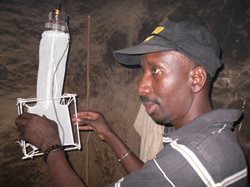"In terms of meeting other colleagues and having face-to-face discussions, ASTMH annual meeting is a one-stop-shop." - Abdoulaye Djimde, PharmD, PhD
 |
| (Abdoulaye Djimde sets up a CDC light trap to collect sand flies that transmit leishmaniasis in a Dogon village in Mali.) |
Abdoulaye Djimde, PharmD, PhD, of Mali, was elected to the ASTMH Council in 2016. He is the Society’s first international Councilor. Prof. Djimde has a long association with ASTMH. He is a 20-year member and has missed only two Annual Meetings during that time. He also earned his PhD while working as a graduate student with two ASTMH Past Presidents, Christopher V. Plowe at the University of Maryland and Thomas E. Wellems at the NIH. Currently, Prof. Djimde is Coordinator of the West African Network for Clinical Trials of Antimalarial Drugs, Leader of the Plasmodium Diversity Network-Africa, and Director of the DELTAS Africa program Developing Excellence in Leadership and Genetics Training for Malaria Elimination (DELGEME). Since 2001, he has been head of MEDRU – MRTC at the University of Science Techniques and Technologies of Bamako, Mali. He has transformed an initial team of two students and a technician to a research group of over 30 scientists exploring how mutation events in the genomes of malaria parasites, human hosts, and mosquito vectors relate to the outcome of treatment and the spread of drug resistance. In February 2017, Prof. Djimde was elected Fellow of the African Academy of Sciences.
What motivated you to run for Council last year?
As a more than 20-year member, I felt that it was time to get to better know how the Society operates and how I could contribute to reaching its noble goals.
You joined ASTMH as a first-year PhD student at the University of Maryland, Baltimore, and have remained a member since. What encouraged you to join and what have been the greatest benefits of membership?
I discovered the Society when my then-thesis supervisor Prof. Christopher V. Plowe encouraged me to present my PhD work at its annual meeting that was happening next door in Baltimore. During that meeting I immediately felt at home and decided to join.
Why do you think it’s important for Africans to consider becoming a member in ASTMH?
I encourage other African scientists and students to join because the ASTMH is a great place to learn good and diverse science in the field of tropical medicine, to meet and network with colleagues from around the World.
You have only missed two Annual Meetings in the last 23 years. What’s your favorite part of the meeting? What stays with you after the leave the Annual Meeting?
Most scientists in the field of tropical medicine present their most recent results at ASTMH each year, so learning the latest in my field is awesome. In addition, in terms of meeting other colleagues and having face-to-face discussions, ASTMH annual meeting is a one-stop-shop.
Now for our final question – we ask it of everyone: You get the opportunity to go back in time. You can either have a conversation with any scientist who has ever lived OR observe a moment of scientific history. What would you choose and why?
A conversation with a prominent scientist would be my first choice because one can learn a great deal and actually develop new ideas from just a few minutes of discussion with the right scientist. Observing a moment of scientific history is symbolically important but it would only supersede the former if I would personally be an actor of that scientific moment.